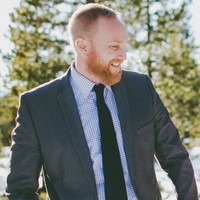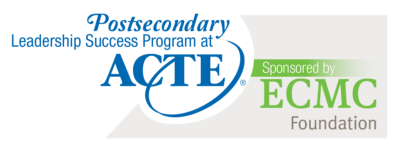 Meet Dan Adams, former statewide director of career pathways at the Oregon Higher Education Coordinating Commission. He’s currently a stay-at-home dad. His Techniques interview appears as part of a digital-exclusive spotlight series on fellows in the Postsecondary Leadership Success Program at ACTE – Sponsored by ECMC Foundation.
Meet Dan Adams, former statewide director of career pathways at the Oregon Higher Education Coordinating Commission. He’s currently a stay-at-home dad. His Techniques interview appears as part of a digital-exclusive spotlight series on fellows in the Postsecondary Leadership Success Program at ACTE – Sponsored by ECMC Foundation.
What leadership skills do you hope to develop as part of the Postsecondary CTE Fellowship?
My commitment to education in pursuit of equity, and equity in pursuit of social justice, began in my own classrooms. I know, from teaching in under-resourced schools — first as a classroom instructor in Birmingham, Alabama, and subsequently as a learning support specialist and postsecondary teaching fellow in Dublin, Ireland — how important education is to expanding opportunities for individuals, for families, and for communities. In my current role as statewide director of career pathways in Oregon, my work is different. But my focus on equitable outcomes remains.
I accepted a postsecondary CTE fellowship with ACTE to develop new tools and strategies that will aid in my work, as a state leader, to build more equitable education systems. The opportunity to collaborate with program participants and fellow CTE administrators is invaluable. I’m able to be vulnerable about my own successes and struggles and to learn from national leaders in postsecondary CTE.
In what ways have you innovated to engage students >amp; inspire colleagues in CTE through the COVID-19 pandemic?
My colleagues are spread out across Oregon at 17 independent community colleges. Each institution experienced and responded to COVID-19 in their own way. When my office closed, the critical first step I took was to tell career pathways grant recipients that I adjusted the timelines for grant deliverables and that I would be available to each of them should they need me. I also implemented weekly “office hours” where grant recipients could gather informally. We leveraged these spaces to share challenges and successes related to moving career pathway programs, most of which are grounded in hands-on training, to remote delivery.
The career pathways data pilot project was just getting underway in March of 2020. This involved gathering input and designing a data system to measure the completion rates of career pathways students for the first time. The pandemic-related delays allowed me to take a month to redesign our work. With the feedback I’d received in the first months of the program, I shifted directions. We moved away from a complicated, four-pronged measuring system to a more streamlined system that used identical criteria for all students. That time for reflection helped us co-design a better process. And we completed ahead of schedule.
Our education systems face many challenges in 2022. Please discuss the steps CTE can take to improve equitable access to high-quality CTE programs of study.
The United States is enduring its second major economic expansion of the past 20 years. According to a 2016 report from Georgetown’s Center on Education and the Workforce, “the economy … added 11.6 million jobs [after the Great Recession. Of those,] 11.5 million, or 99% percent, [went] to workers with at least some college education.” To provide more equitable access, education leaders in Oregon need to make the strongest possible case for fully funding career pathway programs using the best available data.
My work through the PLSP-ECMC Foundation program focuses on expanding access and equity by building a case to fully fund career pathway programs in Oregon. First, I intend to review the available evidence to support career pathways in Oregon and nationwide. Second, I’ll meet with Oregon stakeholders to familiarize myself with current legislative and agency priorities as well as current agency work related to career pathways in Oregon. Third, I will develop a slide deck and whitepaper incorporating the best available evidence and feedback received from stakeholders, Fourth, I will present the slide deck and whitepaper to Oregon stakeholders, revising based on their feedback. And, finally, I will present these resources to the Oregon Higher Education Coordinating Commission for their work with the Oregon legislature.
Learn more about the Postsecondary CTE Fellowship.
Please also meet:
- Tiffanie Rosier, STEM education coordinator at Northern Virginia Community College
- Tachaka Hollins, assistant vice chancellor for academic affairs at the Tennessee Board of Regents
- Tracey D. Cooper, executive director of nursing at Temple College
- Bernie Phelps, director of Perkins, Perkins Rural Reserve and dual enrollment at Montana Technological University, Highlands College
- Vickie Thomas, director of the Center for Workforce and Community Development at Eastern New Mexico University – Roswell
- Moira Lafayette, dean of health sciences and public safety at Blackhawk Technical College
- Brad Kinsinger, director of the Global Agriculture Learning Center at Hawkeye Community College
- Eric Sewell, director of technical education at Southern Union State Community College
- C.J. Wurster, district director at Maricopa County Community College District
- Katie Vincent, director of workforce partnerships at Owensboro Community and Technical College
- Dr. Xue Xing, assistant professor of teaching and learning at University of Nevada – Las Vegas
- Aleksander Marthinussen, program manager with NOVA SySTEMic at Northern Virginia Community College
- Martha Payán-Hernández, director of CTE at Fullerton College
- Ashlee Spannagel, dean of CTE and workforce development at Southeastern Community College
- Darlene O’Rourke, Perkins grant director and officer at Queensborough Community College
- Shelsi Barber-Carter, CTE coordinator at Baton Rouge Community College








